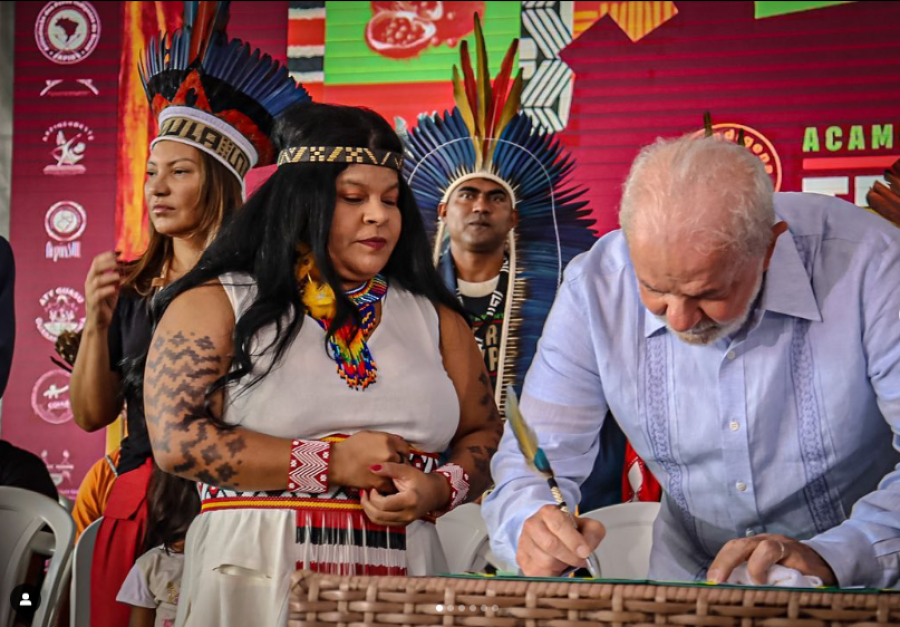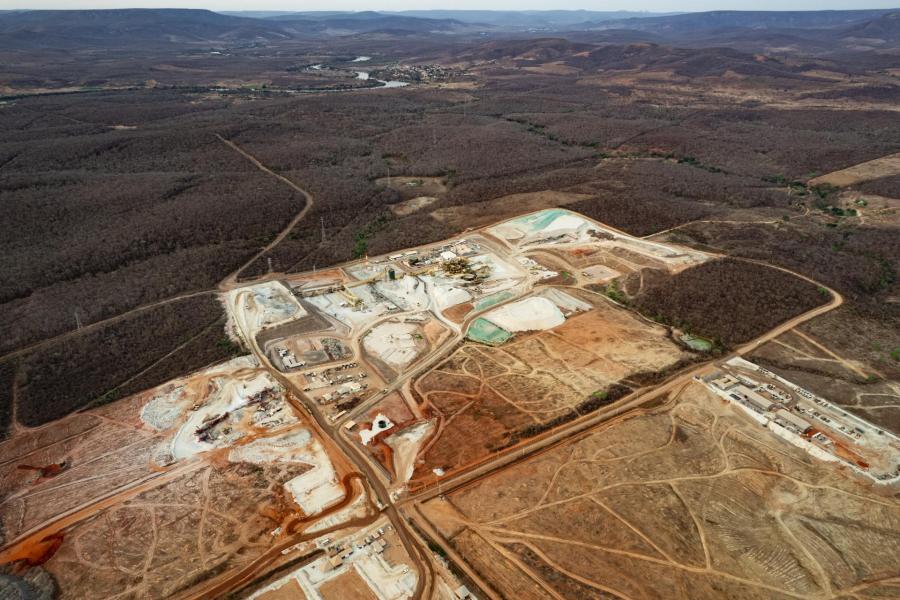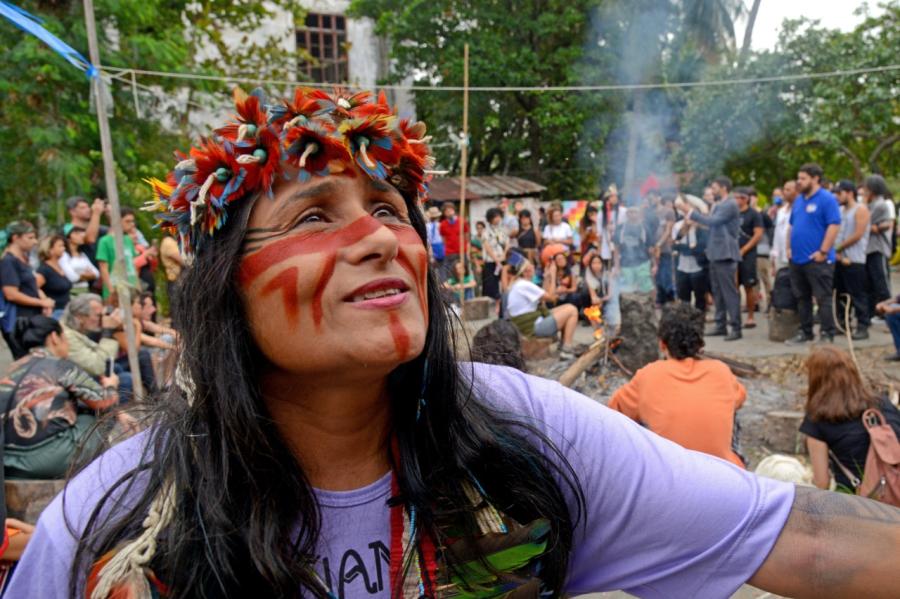Brazilian Indians have taken advantage of the process of abertura ("opening," the process of political democratization initiated by President Joao Figueiredo in 1979) to make significant political gains. But landowners and developers have not stood by idly, and the military government's growing tendency to see and administer land as a national security issue bodes ill for Indian interests.
Octavio Ferreira Lima, the first civilian President of Brazil's National Indian Foundation (FUNAI) since 1979 and only the second civilian in the job in FUNAI's 17-year history, replaced Col. Paulo Moreira Leal, who resigned under pressure in July 1983. The new President promptly replaced several highly-placed military officers in the agency with civilians. Indians, human rights groups, anthropologists, and representatives of the Church had long demanded demilitarization. In fact, the change was an important result of increasingly visible, political activity on the part of indigenous peoples. But a look at other, less publicized changes in FUNAI and its role in securing Indian lands suggests that the outlook for Brazil's Indians is no better than it was a year ago, and may be much worse, owing to higher-level changes in the Ministry of the Interior's land policies.
Political Activity
The election of Xavante Indian chief and longtime Indians' rights activist Mario Juruna to the Camara dos Deputados (the Brazilian equivalent of the US House of Representatives) signalled the rising importance of Indian affairs in national politics in two ways. First, Indians are taking a more active political role, whether in demanding action from FUNAI or in organizing independently (as in the case of UNI - the Union of Indigenous Nations). Second, the issue of indigenous people's rights is increasingly part of national debate. Juruna, a Xavante Indian chief from Mato Grosso, was elected in Rio de Janeiro, making a direct appeal to young left and liberal voters. He made no pretense of addressing local issues in Rio, but ran as a candidate who would champion Indians and their rights. It was widely assumed that his support came exclusively from the affluent "South Zone" (including neighborhoods like Ipanema), which has the best educated, wealthiest electorate in the nation. But some researchers suggest that his appeal was broader, and included a large working class element as well, indicating that Juruna may be seen to represent all the disenfranchised. He has maintained a diligently critical posture toward FUNAI and toward the government in general and has received extensive publicity. Although he is often treated as exotic - the press never tires of calling attention to his less-than-perfect Portuguese (not his first language) - this keeps questions of indigenous rights in the news and has given Juruna a national reputation as an irrepressible voice of criticism. When he called Figueiredo and his party's top leaders "thieves" in the Camara, outraged conservative politicians almost drove him from office and he had to make a formal retraction. But in the population at large, where a growing consensus indicts the military government for having mortgaged Brazil's vast productive resources to foreign banks and multinational corporations, Juruna's popularity soared.
Juruna's frequent criticisms of FUNAI played an important role in the change of administration. Many analysts thought that the major goal of the change from the standpoint of Minister of the Interior Mario Andreazza (responsible for naming the President of FUNAI) was to reduce FUNAI's visibility in the press. Constant denunciations of FUNAI by deputy Juruna were seen as detrimental to Andreazza's ambitions to capture the nomination for President in the ruling PDS. Juruna consistently used his platform as deputy to demand that FUNAI carry through land demarcation projects legally mandated but not done (Leal himself earmarked 82 areas as high priorities for demarcation in his budget request for 1983, of which no more than a handful have been demarcated), and also warned of the dangers of illegal incursions onto Indian land for mining and mineral extraction, a problem in many areas.
But Juruna was by no means alone in keeping FUNAI in the public eye. In June 1983, only a month before Leal's resignation, a group of Xavante Indians occupied FUNAI and denounced Leal, and especially top advisors Colonels Zanoni, Guaranys, and Correia, as anti-Indian for failure to resolve land claims. Juruna led a commission of legislators to FUNAI to talk with the Indians and supported their demands for the exit of the colonels.
This incident followed close after the seizure of a rancher's airplane by Kajabi, Suya, and Juruna in the Xingu National Park, where the plane had landed illegally. The Xingu Indians refused to negotiate after Col. Zanoni (who was in the area when the plane was seized) refused to discuss longstanding grievances, and held the plane for more than a month, denouncing Zanoni Guaranys, and Col. Waldemar Lechtman, chief of FUNAI's division of health, as unresponsive to Indian needs. Zanoni and Guaranys had earned the Xingunos' antipathy with high-handed, authoritarian treatment. In an earlier meeting in the Park, the Indians had already called for the resignation of Lechtman, after he had failed to keep promises to improve medical treatment in the area. The seizure of the airplane clashed with the popular image of Xingu Indians (one promoted by FUNAI) as "pure" Indians living in an idyllic isolation. The airplane was not released until after the colonels denounced by the Indians were removed from their posts. Since the Xingu has long been represented as the best example of FUNAI's policies, the incident was politically damaging to FUNAI and especially the officials named.
Getting rid of the colonels was a solution of sorts. But other changes and processes already in motion suggest that the demilitarization of FUNAI was more a cosmetic maneuver designed to quiet criticism than any indication that defense of Indian interests are a priority in the upper levels of the Ministry of the Interior. To understand the wider significance of these changes, they must be seen in the context of the land policy of the Ministry of the Interior, of which FUNAI is only a small part.
The Indian Statute of 1973 guarantees Indians lands "occupied or inhabited" by them, and this right is not contingent on their having legal title to such lands. In practical terms, legal recognition is necessary in any dispute, and the same statute charges FUNAI with demarcating all Indian lands in the country, a task to have been completed by 1978. This demarcation is nowhere near complete and there is virtually no Indian land not subject to invasions or conflicting land claims. Indians whose land is seized or encroached on by local landowners, multinational corporations, or federally sponsored development schemes, depend on FUNAI to defend their interests.
So the decree signed by President Figueiredo in February of 1983 represents a grave threat to Indian land rights. This decree deprives FUNAI of the power to demarcate Indian lands, allocating this duty to a "work group" composed of representatives of the Ministry of the Interior, the Extraordinary Ministry for Land (Ministerio Extraordinario para Assuntos Fundiarios, a new organization within the Ministry of the Interior), FUNAI, and other federal or state agencies as deemed necessary. What this means is that land, in the eyes of the military government, has become too important an issue to leave even the relatively small areas occupied by Indians under the jurisdiction of FUNAI.
Land in rural Brazil is of special concern to the National Security Council (Conselho Nacional de Seguranca), whose head. General Venturini, is also Minster Extraordinary for Land, and it is not difficult to see why. The purpose of the National Security Council is to suppress armed conflict in Brazil, and nothing in recent years has led to outbreaks of armed violence like conflicts over land. When the transamazonica road system opened, landless peasants in search of land, speculators, ranchers, swindlers, and large developers flooded into all corners of the Amazon basin. These different interests have frequently come into conflict with Indians whose lands they may invade or attempt to appropriate, and even more frequently come into conflict among themselves. Already in 1980 the federal government had created GEBAM (Grupo Executive do Baxio Amazonas) and GETAT (Grupo Executive das Terras do Araguaiae Tocantins) to impose a new, highly centralized federal authority over regional land conflicts in areas where such conflicts are held to be especially serious. These agencies pre-empt existing federal and state bureaucracies with police powers and authority to issue definitive land titles, through which they may intervene in disputes involving various conflicting interests. In many areas these include not only landless squatters and large landowners of the traditional type, but newer agribusiness and mining interests from the southeast. Settling their differences is complicated by multiple land titles and because the interest of the federal government itself is by no means always clear. In some areas, squatters are so numerous, and so desperate after having been driven off successive subsistence plots by ranchers and land swindlers (grileiros), that the new administrative units have issued land titles to them, overriding the local landowners' claims, even though the landowning class is typically the backbone of regional support for the government party. The government must also sort out claims of landowners against the newer capital from the southeast, which, while usually politically linked to the opposition, is seen as offering economically modern and rational land use which will generate export earnings, unlike the old landowners.
In this welter of conflicting interests, Indian lands take on increasing value. There are already no empty spaces left to be parcelled out to the various contenders, so the federal government, with highly centralized administrative groups like GETAT and MEAF, backed with federal police and military muscle, seeks to keep the peace and satisfy contradictory interests on the local level. Supporters of Indian rights fear that giving the power to demarcate Indian lands to the "work group" from MINTGER, MEAF, and FUNAI, means that Indian lands will be used to temporarily settle disputes among other conflicting interests. With almost three quarters of the Indian land already identified as such still undemarcated, such an approach could have the gravest of consequences for Brazilian Indians.
The MEAF has done nothing to allay fears. Since its inception, the ministry has not issued a single statement about Indian lands. Sources within FUNAI, however, have cited the new President as saying his instructions are to not demarcate any Indian land at all.
In this light the demilitarization of FUNAI takes on a different meaning. The agency has been delivered to civilian control, but only after having its most important powers stripped and allocated to groups who do not, even in theory, hold Indian interests as a high priority.
Other developments have threatened Indian lands in more direct ways. In one court case a landowner sued FUNAI over a piece of land in the heart of the Xingu National Park, bought in the late 1940s in one of the many land speculation deals carried out in Sao Paulo by people who typically never saw the land, before the area was officially recognized as an Indian area. The title holder, supported by the state of Mato Grosso (which has long coveted Park lands), maintained that the land in question was not inhabited by Indians at the time he bought it, since the Kajabi who now live closest to the lot moved to the Park in the 1950s. They moved then on the advice of the Park's founders, the Villas Boas brothers, who promised secure land in the Xingu as a solution to increasing encroachment on traditional Kajabi lands further west. Federal courts decided in favor of the landowner, setting a potentially disastrous precedent.
If the Xingu, demarcated in 1968, and widely regarded as the area in which Indian lands are best protected in Brazil, is subject to such claims, then no Indian land can be regarded as secure. Further, titles to the land in the Xingu (as elsewhere) abound. The land has been sold, as Orlando Villas Boas once remarked, "in three stories." If this decision is not overturned, the floodgates are open to further claims, with further expensive indemnifications. If FUNAI were forced to indemnify the holders of such titles wherever demarcation is contemplated, this would further impede the demarcation of Indian lands, given that the federal government faces severe IMF-imposed budget cuts.
The current economic crisis provides an additional edge for arguments favoring development - as opposed to protecting isolated indigenous groups - most recently manifested in a Presidential decree allowing mining on Indian lands. Formerly such activity was prohibited, except in cases of national interest, to be individually determined and authorized by the President. Under the new decree, state and private companies authorized by FUNAI would be permitted to mine on Indian lands and use Indians as labor.
The government of the federal territory of Roraima has also proposed the reopening of mining operations in Serra do Surucucu, in the middle of Yanomami territory. The Yanomami remain one of the most isolated indigenous groups on the continent, and these operations were previously closed by the Minister of the Interior because serious health problems, including tuberculosis and venereal disease, arose from contact between miners and unvaccinated Indians. The President of FUNAI has stated that he plans to allow modern mining firms onto Indian lands as a way of replacing or preempting garimpeiros (poor independent prospectors who mine gold and other minerals by manual labor with the simplest technology) who threaten various indigenous areas, but to many this solution seems as bad as the problem.
Brazil's Indians have shown increasing political organization and militancy, and continue to draw on some sectors of the national society for support. But in the crucial area of land rights, landowners and developers have the upper hand. With the Brazilian government facing economic and political crisis, it will take more national and international support for the indigenous movement, and increased action by that movement, to prevent the government from using Indians' land and resources to bail itself out.
Article copyright Cultural Survival, Inc.



